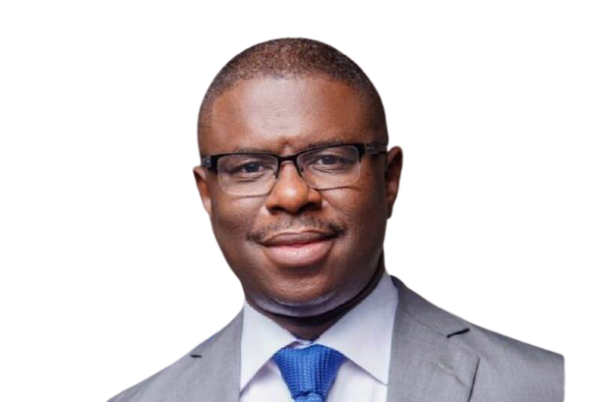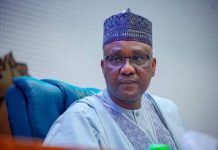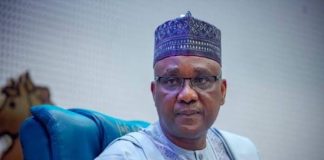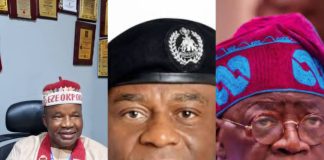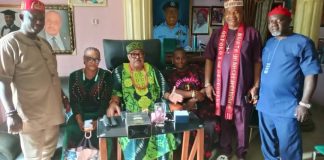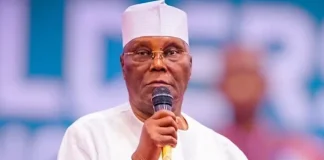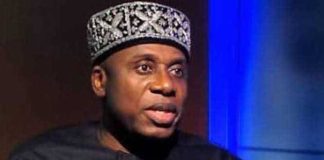🌿 Ruzu Non-Alcoholic Herbal Bitters
Ruzu Non-Alcoholic Herbal Bitters is a natural health supplement specially formulated to:
- ✅ Promote general wellness
- ✅ Detoxify the body
- ✅ Support the treatment of various ailments
Made from a powerful blend of 100% organic and medicinal herbs, Ruzu is completely alcohol-free, making it ideal for:
- 👪 All age groups
- 🌱 Health-conscious individuals
- 🌿 Anyone seeking non-alcoholic herbal remedies
Whether you're looking to boost your vitality, cleanse your system, or support healing the natural way, Ruzu Bitters offers a trusted herbal solution.
The daily currency of democracy is trust. Institutions may retain their names and seals when it disappears, but they become less significant. The recent Chatham House/NBS findings highlight a strained social contract rather than just providing another set of depressing statistics. The police are “greatly distrusted” by nearly half of Nigerians. Approximately one-third of people have serious misgivings about the federal government and the presidency. State legislators, local councils, and courts—that is, the judiciary—all receive low scores. Beneath these statistics is a striking paradox: although most people think that power is more important than honesty in their societies, a greater percentage nevertheless feels horrible when others are taken advantage of. To put it another way, Nigerians have lost faith that integrity would be rewarded, but they have not lost their moral compass.
A nation is held together by the silent infrastructure of trust. When it deteriorates, as it has in Nigeria, it not only damages people’s reputations but also destroys the very institutions that are supposed to safeguard, support, and stabilize society. The police become a source of fear rather than security, courts become places of suspicion rather than justice, and ministries become echo chambers rather than forces behind policy. “Dearth of Integrity in Public Life” (November 2023), “Greed, Ethics, and Public Service in Nigeria” (January 2024), “Trust and Economic Recovery” (November 2024), “Nigeria Decides 2023: Campaign Promises and the Issue of Trust” (January 2023), and “Accountability Deficit and the Transparency Question” (September 2023) have all issued warnings about this tendency. The main idea is straightforward: without trust, government cannot operate efficiently.
There are significant ramifications for the presidency. The presidency is more than just a position in every constitutional democracy; it is a representation of sovereignty and the point at which citizens view the power to rule as legitimate. The ease with which the government can ensure compliance, enforce the law, and uphold order diminishes as trust in that symbol declines. Every change encounters resistance, distrust, and delay; the gap between decree and performance grows; and the expense of governance rises. Formal power may still be in the hands of a president, but the informal consensus that underpins power becomes brittle. The ability of the state to act in the public good without constant opposition or uncertainty is at risk, not just popularity ratings. People start conducting their lives outside of the state through private security, unofficial payments, and parallel services if the center is unable to effectively demonstrate fairness and outcomes.
The report’s discovery of a near-unanimous belief that political and economic power now take precedence over integrity and constitutionally protected rights is equally concerning. Democracy turns into performance when power overrides principle. People lower their expectations and accept corruption as unavoidable and impunity as the norm. Because governmental institutions frequently seem aloof, capricious, or predatory, people eventually turn to private coping mechanisms like ethnic solidarity, informal economies, and transactional shortcuts, which weakens societal cohesiveness.
The economy bears a cost as well. Corruption is a daily efficiency tax as well as a moral transgression. It takes public funds away from roads, clinics, and classrooms. It makes doing business more expensive and erodes the rule of law. Nigeria’s news story GDP encourages comparisons with the largest countries in Africa, while GDP per capita reveals a distinct picture of household prosperity. It is no accident that a nation facing gaps in service delivery also has persistently high rates of poverty. People tend to become disengaged when they see budgets with unclear results. They pose a reasonable query when urged to increase the tax base: where does the money go? Tax morale and trust are like twins; you cannot improve one while ignoring the other.
The lack of trust took time to manifest. For twenty-five years, Nigerians have had to put up with anti-corruption initiatives that frequently produced more headlines than outcomes. Too often, the public interest has been subordinated to party allegiance, impartial justice has been replaced by selective enforcement, and institutional incentives have rewarded survival within a dysfunctional system rather than improving it. Reform fatigue is the outcome: people hear the correct words, but they’ve learnt to wait for evidence before believing. Every broken promise lowers the “cost of corruption,” which is the perception that misbehavior is common, profitable, and never punished, while subtly increasing the “cost of honesty,” which is the danger that following the rules makes one poorer, slower, and excluded.
When official statements claim that corruption has been eradicated while everyday experiences and independent statistics show otherwise, the gap between declarations and reality widens. Leaders foster public trust by explicitly illustrating the relationship between income and outcomes and by encouraging outside validation, rather than by asserting that current sufferings will result in future advantages. In difficult times, humility is a prerequisite for teamwork rather than a sign of weakness in leadership. More trust is gained by an honest acknowledgment, such as “we are falling short here; here is what we will do by these dates; and here is how you can check,” than by triumphant statements that don’t align with reality.
However, the Chatham House project also reveals a subtle strength: civic preparedness. According to nearly half of the respondents, public spending on development projects is something that their communities are eager to monitor. This is not unimportant. Successful nations have developed repeatable, citizen-centered mechanisms that make corruption more difficult, expensive, and dangerous rather than relying solely on elite willpower. Nigeria has the chance to move from exhortation to architecture by enabling communities to monitor projects, publish contracts, and establish avenues for grievances to be addressed. How might a legitimate reset appear?
The president should immediately acknowledge that rebuilding trust is a national priority and that it is currently lacking. Alignment is the issue here, not blame. Dates, owners, and public milestones should be included in a brief, time-bound action plan. This may include implementing body-worn cameras in high-risk areas, setting up independent complaints procedures that make their findings public, and releasing yearly integrity reports that point out patterns and suggest corrective measures. Make open contracting the standard for all MDAs in procurement, and hold off on awarding large contracts until the beneficial ownership data is finished and accessible to the public. Go beyond catchphrases when it comes to whistleblowing: establish strong safeguards, ensure anonymity, and show that significant tips result in quantifiable enforcement.
Policing ought to be quantifiable and equitable. Rather than in policy documents, trust in the police is often built on the side of the road. Establish an impartial complaints system with the authority to look into complaints, publish results, and suggest penalties—and then carry them out. Install body-worn cameras in hotspots with explicit guidelines for their use, storage, and public dissemination following serious occurrences. Release an annual integrity report that includes information on stop-and-search statistics by location, disciplinary actions taken, and complaints by type and outcome. Learn about procedural fairness, the science that demonstrates that when procedures are courteous and open, people follow them even when the results are unfavorable. Combine this with incentives and officer protections to make effective policing safer and more fulfilling than rent-seeking.
To cut down on wait times, digitize justice. Delaying justice is denying trust. Effective case tracking is essential and needs to clearly display, in plain language, the quantity of cases filed, the average processing time, and their results. For important phases, like as filing, arraignment, evidence disclosure, and trial scheduling, establish service-level agreements and submit quarterly performance reports. Prioritize cases involving violent crimes and corruption by designating specialized judges and establishing stringent deadlines.
Acknowledge that the social compact is based on facts. The government’s goal is to increase the revenue base. Until people witness taxes being converted into infrastructure and services in their communities, that will not occur on a large scale. Establish a monthly “Money to Services” ledger that tracks, project by project, how revenue translates into outcomes, such as the delivery of classrooms, the operation of water schemes, the equipping of hospital wards, and the ability to drive on roads during the wet season.
Naturally, reform is a routine rather than propaganda or a news release. It requires measurements to remain trustworthy. Every quarter, publish a brief national scorecard that shows the percentage of people that “strongly trust” the federal government, the police, and the president (with a goal to increase this by a specific amount of percentage points within 12–18 months).
This is not going to be painless. Those who stand to gain from the current balance will oppose it. After hearing such promises, citizens will become weary of reform. There will be misinformation tactics aimed at obscuring victories and magnifying failures. Additionally, economic shocks that test resolve will occur. Sequencing rapid wins (particularly in frontline services), safeguarding reform champions, and communicating with rhythm and candor are all necessary to mitigate these dangers.
In the end, trust makes sense. People trust because of the predictable and equitable behavior of systems, not because they are taught to. The values dilemma of Chatham House amply illustrates that Nigerians still have a strong desire for justice. The expectation that honesty is inexpensive is what they have lost. The difficult task ahead is to rebuild that expectation. It entails raising the price of corruption while lowering the price of honesty. It entails shifting from integrity as infrastructure to anti-corruption as theater. Additionally, it necessitates a different attitude from leadership, one that views legitimacy as a resource that can be renewed by everyday behavior rather than as inherited authority.
Trust will follow—not as sentiment, but as reason—if we can make taxes clearly become services, make justice quantifiably faster and more equitable, and make wrongdoing consistently costly. A state that operates in ways that citizens can observe, test, and believe is the route out of cynicism. And when trust starts to reappear, it will be more resilient than optimism—confidence gained by organizations that operate in the everyday rhythm of Nigerian life without drama. The task at hand is to make integrity more affordable than impunity and service more fulfilling than cynicism so that our institutions serve as tools of the common good rather than as strongholds of power.

